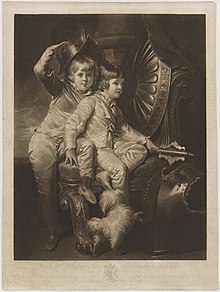Lord Charles Spencer-Churchill
British army officer and politician From Wikipedia, the free encyclopedia
Lieutenant-Colonel Lord Charles Spencer-Churchill (née Spencer; 3 December 1794 – 28 April 1840) was a British Army officer and politician. He was the second son of George Spencer-Churchill, 5th Duke of Marlborough and Lady Susan Stewart, daughter of John Stewart, 7th Earl of Galloway.
Lord Charles Spencer-Churchill | |
|---|---|
 George Spencer-Churchill, 6th Duke of Marlborough when Earl of Sunderland; Charles Spencer-Churchill | |
| Birth name | Lord Charles Spencer |
| Born | 3 December 1794 |
| Died | 28 April 1840 (aged 45) London |
| Buried | |
| Allegiance | United Kingdom |
| Service | British Army |
| Years of service | 1811–1832 |
| Rank | Lieutenant-colonel |
| Unit | 52nd Regiment of Foot 75th Regiment of Foot |
| Battles / wars | |
Life and career
Summarize
Perspective
His surname was Spencer until 1817, when his father changed his and his children's surname to Spencer-Churchill (by royal licence dated 26 May 1817).[1] Spencer entered the British Army in 1811, and he served in Spain and France. He transferred from the 85th Foot to the 75th Foot as a captain in 1824. He purchased a Lieutenant-Colonelcy in 1827 and sold his commission in 1832. From 1818 until 1820, he also represented St. Albans in the House of Commons.[2]
He married Etheldred Catherine Benett on 24 August 1827 and had five children:[3]
- Susan Spencer-Churchill (d. 2 February 1898), married the Rev. and Hon. John Horatio Nelson, son of Thomas Nelson, 2nd Earl Nelson, and had issue
- Lt.-Col. Charles Henry Spencer-Churchill (27 May 1828 – 3 April 1877), married in 1862 to Rosalie Lowther, daughter of the Reverend Gorges Paulin Lowther
- Etheldreda Catherine Spencer-Churchill (15 June 1829 - 24 October 1881)[4]
- Lucy Caroline Spencer-Churchill (29 January 1832 - 13 March 1904), married in 1880 to Rev. John Fletcher Dixon-Stewart, uncle of Rowena, Duchess of Somerset.[5]
- John Kemys George Thomas Spencer-Churchill (27 December 1835 – 9 August 1913), married Edith Maxwell Lockhart, aunt of the novelist Jean Rhys[6]
Spencer-Churchill was returned to Parliament in 1830 as member for the family borough of Woodstock, but went out in 1832 when the representation of that borough was reduced by the Great Reform Act. He replaced his elder brother, the Marquess of Blandford, in 1835, but having joined the Whigs was defeated in the election of 1837. Lord Charles was previously a Tory and, unlike his brother, did not support Reform.[2]
References
External links
Wikiwand - on
Seamless Wikipedia browsing. On steroids.
